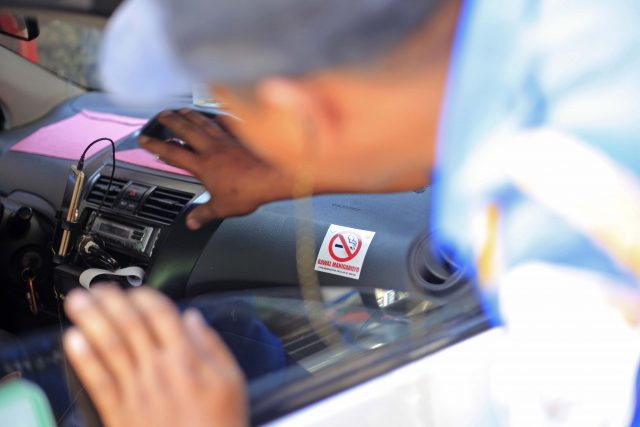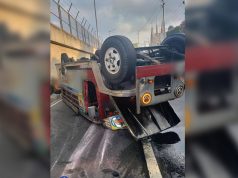
MANILA – What are deemed ‘manifestly prejudicial to safe driving’? An ambiguous provision worded thus, in a joint order by three transport agencies several years ahgo has worked havoc on the enforcement of the Anti-Distracted Driving Act (ADDA), a law originally designed mainly to prevent road accidents as a result of motorists calling or texting while driving.
Lawmakers have thus called for a review of the implementing rules and regulations of the ADDA as commuter safety advocates warned against “over-stretching” the law with the numerous controversial bans imposed on motorists by transport agencies.
The advocates for commuter safety warned that, even as the transport agencies have already over-interpreted the law and its intent, traffic enforcers on the ground are bound to compound the situation by adding their own interpretations to what the ADDA bans. This, analysts had said earlier, could open up avenues for extortion or corruption, while hardly denting the real enemy: risks to road safety.
Senate Majority Leader Vicente Sotto III even urged the Department of Transportation (DOTr) to hold implementation of the ADDA while the Senate Committee on Public Services reviews the IRR, which he said exceeded the intent of the law.
In effect, the Land Transportation Regulatory and Franchising Board and the Land Transportation Office are legislating on their own, warned Sotto, who said he was familiar with the deliberations and the intent of the authors of the law passed many years ago. Sotto recalled the deliberations then centered mainly on the flagrant use of mobile phones for calling and texting by motorists, a bad practice blamed for many road accidents.
Sotto was supported in his call for a suspension of the implementation and IRR review by Sen. JV Ejercito, who issued a separate statement.
“Looks like their officials (DOTr) did not understand the essence of the Anti-Distracted Driving Act. They have made matters complicated, when it is basically just about banning the use of cellphones while driving,” Ejercito said as Public Services Committee Vice Chairman.
Ejercito said that cellphones when used for navigational purposes should be permitted to aid motorists from steering clear of heavy traffic.
“It is counter-intuitive when using Waze or other navigation apps since the use of cellphone is less dangerous if it is within the line of sight. Every second that the driver’s eyes are on the road counts. Mas delikado pa yumuko!” he explained.
Ejercito said that the DOTr should reconsider the strict provisions regarding the placement of cellphones within the line of sight of drivers.
“We rarely hear of road accidents that result from the use of navigational apps. Definitely, texting and tinkering with a mobile phone while driving is a no-no. But when it is used as a navigational aid and it is properly placed, it is okay,” he said.
Joint order also over-interpreted – Inton
Meanwhile, Atty. Ariel Inton, president of the Lawyers for Commuters Safety and Protection (LCSP), said
“It is clear that the coverage of the law is only for gadgets” that distract drivers.
In a statement, speaking mostly in Filipino, Inton noted that valid questions have been raised as to the propriety of the implementors’ coverage of what “distractions” are meant by the law, when even rosaries that usually hang from or wrapped around rear view mirrors have been banned, “even though they are not cellphones or headphones and are not covered by law.”
Inton took issue the implementors’ explanation that these items are covered by an Aquino-era Joint Administrative Order (JAO) of LTO, LTFRB and the DOTr’s predecessor, the DOTC. “However, there is nothing in the JAO that says items like the rosary are banned,” he pointed out.
This was just lifted, Inton said, from a provision in the JAO that broadly prohibits any item “manifestly prejudicial to safe driving.” This, Inton said, should not be allowed to be the basis of over-interpretation by over-zealous agencies and, subsequently, by traffic enforcers on the ground who may have their own ideas about what constitutes something “manifestly prejudicial to road safety.”
In truth, Inton pointed out, “there are so many things that distract a driver but have become ordinary or routine.” This, he said, has thus opened wide the debates on whether these, too shouldn’t be banned: for instance, a jeepney driver stretching his hand backward to receive money and give change to passengers. Already, some people are saying drinking coffee or water are distractions, but public transport drivers complain they need to have coffee for early morning duty, and water to rehydrate or prevent hypertension at midday when the heat in traffic could be unbearable.
“Meanwhile, I believe the first priority is to ensure traffic law enforcers have a clear idea of what the law is about in order to prevent confusion and arguments on the streets,” said Inton, speaking in Filipino.
The LCSP is calling for an all-out dry-run of the ADDA before full-scale implementation, and a review of the ground rules. Any interpretation on the ground by the enforcers should be rooted firmly in the provisions of the law, and not just born out of individual opinions or interpretations, which could vary, said Inton’s group.
‘IRR authors legislated own law’
In seeking a review of the IRR by the Senate committee on public services, Sotto said that panel, chaired by Sen. Grace Poe, can use its oversight functions.
One provision that Sotto wants clarified is the description of line of sight, which became the implementors’ basis for saying the rosary is distracting to the driver.
Sotto, who drives his own car, said even he is now confused by the “line of sight” description and prohibitions. For instance, he said, some cars like his has what is called a “heads up display” that reflects on the windshield the RPM and speed.
Does this mean he should have this feature taken out even though it was part of the vehicle when he bought it?
Sotto said the DOTr can motu propio suspend implementation of the ADDA temporarily pending the IRR review, stressing, “we did not intend the law to be that way.”
The senator said he will push his proposal in plenary.
The problem, Sotto said, is rooted in the fact that the original authors of the law had a different, specific goal in mind, but the authors of the IRR have tended to legislate their own law.
Sotto said if DOTr refuses to heed the Senate’s suggestion, senators could also play hardball with the DOTr’s budget. – With a report from MaeAnne Los Baños, News5
Click and watch this video report below:









